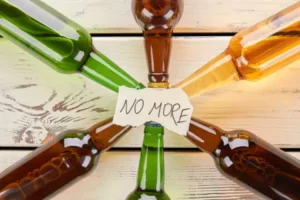
Those ensnared in its clutches face a relentless battle that progressively worsens over time. What starts as occasional social drinking can can alcohol kill you quickly spiral into a debilitating addiction that takes precedence over all other aspects of life. The longer one remains in this cycle, the harder it becomes to escape its grip.
Is Addiction A Choice Or A Disease?
However, scientists remain unsure about how sudden deaths arise from AUD. Sudden death in the context of AUD is not the same thing as death from alcohol withdrawal. Research suggests that it can arise due to a sudden worsening in liver problems, which AUD can cause. In some cases, heavy alcohol usage can mean that people with alcohol withdrawal do not respond well to benzodiazepines.

Long-term Consequences of Alcohol Poisoning
You may have fallen into a pattern of using alcohol to cope with stress or simply feel that you need it to function. This stage often still involves other people, but you may find yourself drinking alone to stave off boredom or unpleasant emotions. You will typically consume alcohol with others in social situations rather than alone, such as at a party or after-work drinks with colleagues.

Things You Can Do to Prevent Alcohol-Related Deaths
But if you feel you need extra help, you may want to check out your local branch of Alcoholics Anonymous. But once the sedative effect wears off, it can disrupt or lower the quality of your sleep. Binge drinking too often can make it harder to fall asleep and stay asleep.
- Moreover, alcoholism has been linked to an increased risk of heart disease, further jeopardizing the individual’s well-being.
- Having a glass of wine with dinner or a beer at a party here and there isn’t going to destroy your gut.
- This can cause other organs in your body to shut down and increase your risk for death.
- Remember, even if you have one or more of the below factors, it does not necessarily mean that you will develop an alcohol addiction.
- Alcohol poisoning also can occur when adults or children accidentally or intentionally drink household products that contain alcohol.
- The severity of these long-term effects can vary depending on the individual and their overall health.
- But it can also occur due to non-beverage alcohol (ethanol), which is in things like mouthwash, cologne and cough medicine.
- Ingesting more alcohol than the liver can process leads to intoxication and interrupts the brain’s automatic functions, such as breathing and heart rate, which can result in coma and death 1.
If they are having a difficult time swallowing, do not force them to drink. If they https://ecosoberhouse.com/article/the-cycle-of-addiction-and-how-to-break-it/ breathed in isopropyl, move them to fresh air right away. If you ingest isopropyl, you are at high risk of poisoning yourself, according to the Toxicology Data Network, since your body absorbs 80% of an oral dose in 30 minutes.
Four Ways to Die…by Mixing Alcohol with Other Drugs
- Your doctor can also discuss the symptoms you may experience and the medications they may prescribe to ease them.
- It’s important to understand that every person reacts differently to alcohol, so there is no definitive amount of alcohol that can be considered safe for everyone.
- Beyond this, other symptoms of withdrawal like insomnia, anxiety, depression, and nausea can all be controlled using medications.
- Numerous heart studies suggest that moderate alcohol consumption helps protect against heart disease by raising good cholesterol and stopping the formation of blood clots in the arteries.
- The Healing Place is available 24/7 to discuss your treatment options.
The sudden removal of alcohol can cause fatal arrhythmias, where the heartbeat becomes so irregular the heart fails. This complicated biological process is due to the fact that alcohol interferes with the balance of GABA (an inhibitory neurotransmitter) and glutamate (an excitatory neurotransmitter). Similarly, there are physiological changes as a result of long-term alcohol abuse. Of those who develop seizures, about 3 percent may have a more serious type of seizure called status epilepticus. This is medical emergency that can lead to disability or death.

For a man, binge drinking is when you have five or more drinks in less than 2 hours. Teens and college-age adults are most likely to engage in binge drinking. You’ll need to go to hospital to be monitored if you have alcohol poisoning. It can cause serious complications, like liver and heart failure, which can be fatal.
Risk Factors for Alcohol Poisoning
- This leads to rapid increases in BAC and significantly impairs brain and other bodily functions.
- In these cases, a person needs to consult a doctor to determine how to best treat their AUD.
- If alcohol continues to accumulate in your system, it can destroy cells and, eventually, damage your organs.
- Alcohol diminishes coordination and cognitive function, making accidents and injuries a distressing reality for those under its influence.
Another issue with all hand sanitizers is that they can be irritating to the stomach, causing nausea or vomiting if swallowed. Ask any recovering alcoholic and they may tell you that the detox process often made them feel as if they were dying. Of course, we do know that withdrawal itself is not a cause of death. However, there are two notably concerning symptoms of withdrawal that are linked to the occasional death of recovering alcoholics. It’s also important to remember that BAC can continue to increase as long as 40 minutes after your last drink. Therefore, if you’ve consumed a lot of alcohol, you could still be at risk for alcohol poisoning even if you’ve stopped drinking.
Binge drinking
Inpatient rehab costs vary widely due to factors like treatment complexity, stay duration, and location. Discover how inpatient rehab durations vary from 28 days to 6+ months. Learn factors influencing stay length, what to expect, and how to achieve lasting recovery. The frequency of outpatient rehab sessions typically ranges from 1 to 3 days per week, tailored to an individual’s needs, treatment plan, and progress for effective recovery. Inpatient alcohol rehab costs range from $6,000 to alcoholism treatment $20,000/month, covering services like therapy, detox, and meals.
